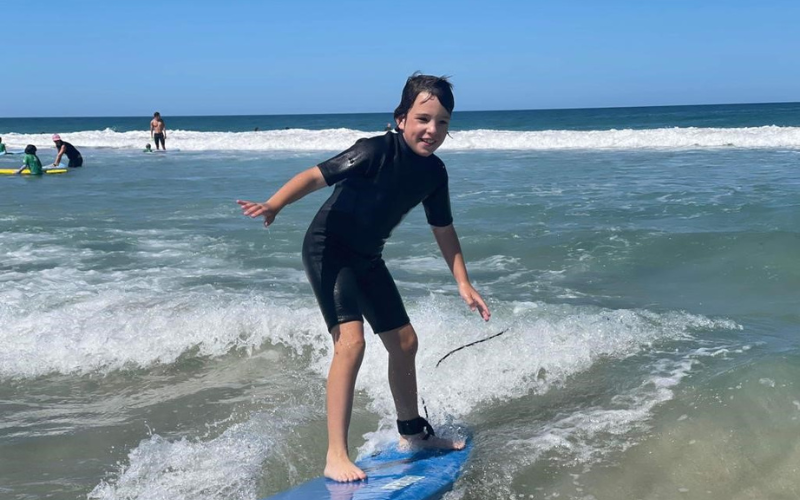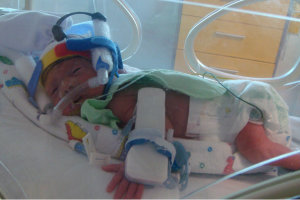
Ten-year-old Keelan Mullins is known to his mum Clare Hindle as her ‘miracle baby’. Keelan was born in March 2013 at 26 weeks’ gestation and weighing just 1096 grams.
Keelan means ‘small and slender’, with the shortened version of his name ‘Kilo’ referring to his birth weight.
Considering Keelan’s start in life, it is a miracle to see how his life has turned out, a result which Clare attributes to research and the care of the ‘amazing’ medical professionals who helped Keelan in his early years.
Keelan spent the first four months of his life at King Edward Memorial Hospital, hooked up to machines to help him with his breathing, fighting off numerous infections, and undergoing four blood transfusions.
“The first eight weeks of Keelan’s life were definitely the trickiest,” Clare said.
“I didn’t get to hold my baby for five weeks, which was incredibly difficult, and although I spent 10 hours every day with Keelan, walking away from the hospital without my baby was the hardest part.
The next few years of Keelan’s life involved many visits to the hospital emergency department with breathing difficulties, and two longer stays in hospital due to Keelan having bronchiolitis.
"We needed to be very careful because we were worried that Keelan would catch a virus and end up back in hospital. We never took him to indoor public places like the supermarket or shopping centres, and day care wasn’t an option for him.
“We also needed to be very strict on his interactions with others, and with things like sanitising his hands after he’d touched certain things.”
As years went by, Keelan grew stronger and developed well. He was able to start school at the normal age and today he lives with ‘exercise induced asthma’ but leads a full and active life, together with his younger brother six-year-old Tommy.
“Keelan is such a sweet kid - really chilled and calm-natured - and enjoys lots of activities like reading, maths, playing Nintendo, and learning guitar, as well as playing soccer, swimming, surfing, skateboarding and doing judo, which he now has his green belt in and recently won a gold medal for.
“He’s done swimming from quite a young age and we’ve always encouraged this because it’s good for his lungs, so it’s great that he loves to swim,” Clare said.
In 2022 when Keelan was nine years old, he was invited to be a part of a study which aimed to determine the effectiveness of a common asthma medication, the inhaled corticosteroid fluticasone propionate, or ‘Flixotide’, for treating ongoing breathing problems in preterm born children aged six to 12 years old, who were born at less than 32 weeks gestation.
The study followed 87 children for 12 weeks on the inhaled medication. As a control for this study, 83 children received a placebo, which did not contain the drug.
Participants undertook a baseline visit consisting of a lung health questionnaire, lung function testing and the collection of biological samples. They were then followed up 12 weeks later to assess any changes in their lung function after taking Flixotide or a placebo twice daily for the 12-week period.
The study, led by Associate Professor Simpson, who is Co-Head of the Children’s Lung Health team at the Wal-yan Respiratory Research Centre – a powerhouse partnership between The Kids Research Institute Australia, Perth Children’s Hospital Foundation and Perth Children’s Hospital – was published in The Lancet Child & Adolescent Health in June.
The five-year Preterm paediatric Inhaled CorticoSteroid Intervention (PICSI) study found that children who received Flixotide experienced modest improvements in lung function, compared to children in the control group, but nearly one quarter (23 per cent) of children experienced a significant improvement in their lung function.
In addition, the study identified a group of children who benefited the most from corticosteroids, based on two markers of health measured at the start of the study. This finding may one day help clinicians identify which children will benefit the most from corticosteroid treatment.
Associate Professor Simpson said the findings of this study may change the way some preterm babies are treated, leading to improved respiratory health in this population.
The medical community are only just starting to understand that many survivors of very preterm birth have life-long deficits in their lung health, which may in fact be progressive over the lifespan. We urgently need effective treatments.
“It's fantastic to show that inhaled corticosteroids can significantly improve lung function in a subset of children born very preterm. These results may help guide the clinical management of these children," Associate Professor Simpson said.
"However, this study is really just the tip of the iceberg in terms of what needs to be done to find effective treatments for children surviving preterm birth with prematurity-associated lung disease."
Clare said that they’ve always said yes to requests to be involved in research.
“If we don’t do research, how will we know how to do things differently or better, and how are we going to help other people. We would never get anywhere in life - it’s just so important.
"I know that if it wasn’t for medical research, Keelan wouldn’t have survived being born at 26 weeks, let alone thrived and become the incredible kid that he is today," Clare said.
“Keelan also likes to be involved because he likes to understand what’s happened to him - he’s curious and inquisitive, and proud of his journey. He’s also proud to be a part of the research – he wants to help other people.”
What’s next
- Further studies are now needed to work out how to predict which kids will benefit the most from this intervention, and to trial fluticasone for a longer period of time to determine if extended usage prevents lung function decline in this population.
- In addition, other interventions to improve the respiratory health of kids born very preterm need to be investigated, so that we can give these kids the greatest opportunity to grow up with healthier lungs.
The paper Inhaled corticosteroids to improve lung function in children born very preterm in Australia (PICSI): a randomised, double-blind, placebo-controlled trial was published in the journal The Lancet Child & Adolescent Health and can be read here.
This research was supported by the Australian National Health and Medical Research Council and carried out in collaboration with the Curtin School of Allied Health, within the Faculty of Health Sciences at Curtin University, and the Department of Respiratory and Sleep Medicine at Perth Children’s Hospital.
Related: Common asthma drug gives hope for better lung health for some preterm babies

